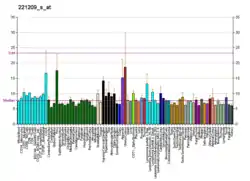OTOR
Otoraplin is a protein that in humans is encoded by the OTOR gene.[5][6]
| OTOR | |||||||||||||||||||||||||
|---|---|---|---|---|---|---|---|---|---|---|---|---|---|---|---|---|---|---|---|---|---|---|---|---|---|
| Identifiers | |||||||||||||||||||||||||
| Aliases | OTOR, FDP, MIAL1, otoraplin | ||||||||||||||||||||||||
| External IDs | OMIM: 606067 MGI: 1888678 HomoloGene: 10600 GeneCards: OTOR | ||||||||||||||||||||||||
| |||||||||||||||||||||||||
| |||||||||||||||||||||||||
| |||||||||||||||||||||||||
| Orthologs | |||||||||||||||||||||||||
| Species | Human | Mouse | |||||||||||||||||||||||
| Entrez | |||||||||||||||||||||||||
| Ensembl | |||||||||||||||||||||||||
| UniProt | |||||||||||||||||||||||||
| RefSeq (mRNA) | |||||||||||||||||||||||||
| RefSeq (protein) | |||||||||||||||||||||||||
| Location (UCSC) | Chr 20: 16.75 – 16.77 Mb | Chr 2: 143.08 – 143.08 Mb | |||||||||||||||||||||||
| PubMed search | [3] | [4] | |||||||||||||||||||||||
| Wikidata | |||||||||||||||||||||||||
| |||||||||||||||||||||||||
The protein encoded by this gene is secreted via the Golgi apparatus and may function in cartilage development and maintenance. A frequent polymorphism in the translation start codon of this gene can abolish translation and may be associated with forms of deafness. This gene is a member of the melanoma-inhibiting activity gene family. In addition, alternate polyA sites exist for this gene.[6]
References
- GRCh38: Ensembl release 89: ENSG00000125879 - Ensembl, May 2017
- GRCm38: Ensembl release 89: ENSMUSG00000027416 - Ensembl, May 2017
- "Human PubMed Reference:". National Center for Biotechnology Information, U.S. National Library of Medicine.
- "Mouse PubMed Reference:". National Center for Biotechnology Information, U.S. National Library of Medicine.
- Robertson NG, Heller S, Lin JS, Resendes BL, Weremowicz S, Denis CS, Bell AM, Hudspeth AJ, Morton CC (Sep 2000). "A novel conserved cochlear gene, OTOR: identification, expression analysis, and chromosomal mapping". Genomics. 66 (3): 242–8. CiteSeerX 10.1.1.327.2446. doi:10.1006/geno.2000.6224. PMID 10873378.
- "Entrez Gene: OTOR otoraplin".
Further reading
- Robertson NG, Khetarpal U, Gutiérrez-Espeleta GA, et al. (1995). "Isolation of novel and known genes from a human fetal cochlear cDNA library using subtractive hybridization and differential screening". Genomics. 23 (1): 42–50. doi:10.1006/geno.1994.1457. PMID 7829101.
- Cohen-Salmon M, Frenz D, Liu W, et al. (2001). "Fdp, a new fibrocyte-derived protein related to MIA/CD-RAP, has an in vitro effect on the early differentiation of the inner ear mesenchyme". J. Biol. Chem. 275 (51): 40036–41. doi:10.1074/jbc.M002876200. PMID 10998416.
- Rendtorff ND, Frödin M, Attié-Bitach T, et al. (2001). "Identification and characterization of an inner ear-expressed human melanoma inhibitory activity (MIA)-like gene (MIAL) with a frequent polymorphism that abolishes translation". Genomics. 71 (1): 40–52. CiteSeerX 10.1.1.418.1999. doi:10.1006/geno.2000.6409. PMID 11161796.
- Deloukas P, Matthews LH, Ashurst J, et al. (2002). "The DNA sequence and comparative analysis of human chromosome 20". Nature. 414 (6866): 865–71. doi:10.1038/414865a. PMID 11780052.
- Strausberg RL, Feingold EA, Grouse LH, et al. (2003). "Generation and initial analysis of more than 15,000 full-length human and mouse cDNA sequences". Proc. Natl. Acad. Sci. U.S.A. 99 (26): 16899–903. doi:10.1073/pnas.242603899. PMC 139241. PMID 12477932.
- Clark HF, Gurney AL, Abaya E, et al. (2003). "The secreted protein discovery initiative (SPDI), a large-scale effort to identify novel human secreted and transmembrane proteins: a bioinformatics assessment". Genome Res. 13 (10): 2265–70. doi:10.1101/gr.1293003. PMC 403697. PMID 12975309.
- Zhang Z, Henzel WJ (2005). "Signal peptide prediction based on analysis of experimentally verified cleavage sites". Protein Sci. 13 (10): 2819–24. doi:10.1110/ps.04682504. PMC 2286551. PMID 15340161.
- Gerhard DS, Wagner L, Feingold EA, et al. (2004). "The status, quality, and expansion of the NIH full-length cDNA project: the Mammalian Gene Collection (MGC)". Genome Res. 14 (10B): 2121–7. doi:10.1101/gr.2596504. PMC 528928. PMID 15489334.
This article is issued from Wikipedia. The text is licensed under Creative Commons - Attribution - Sharealike. Additional terms may apply for the media files.




